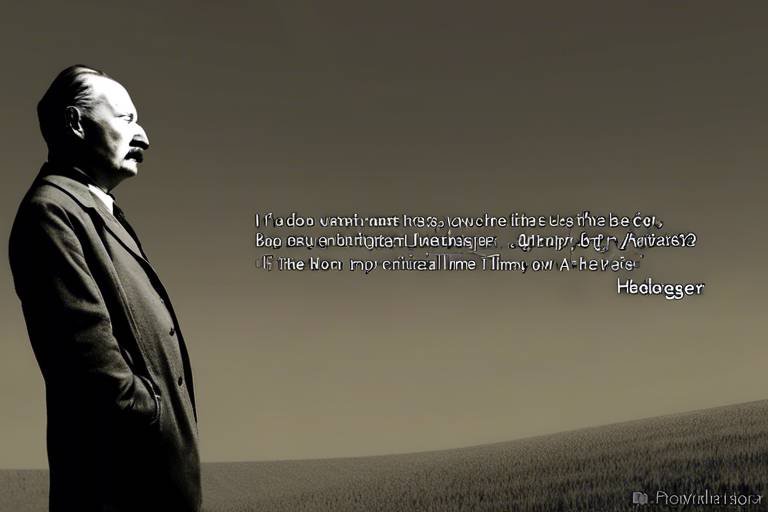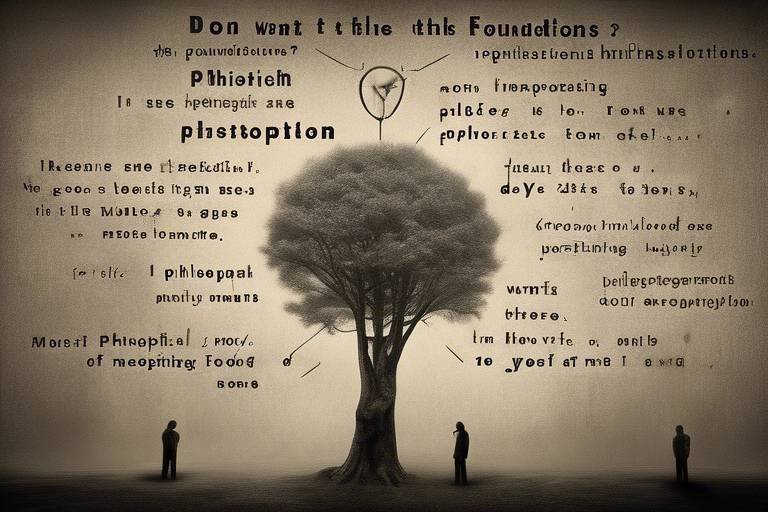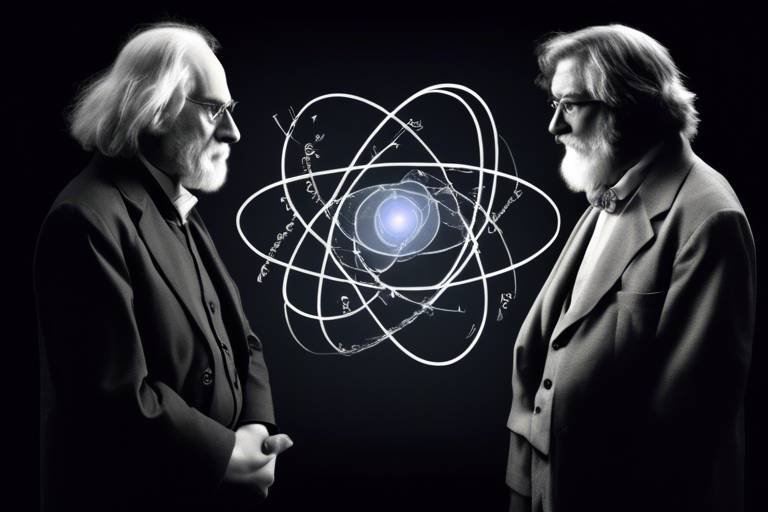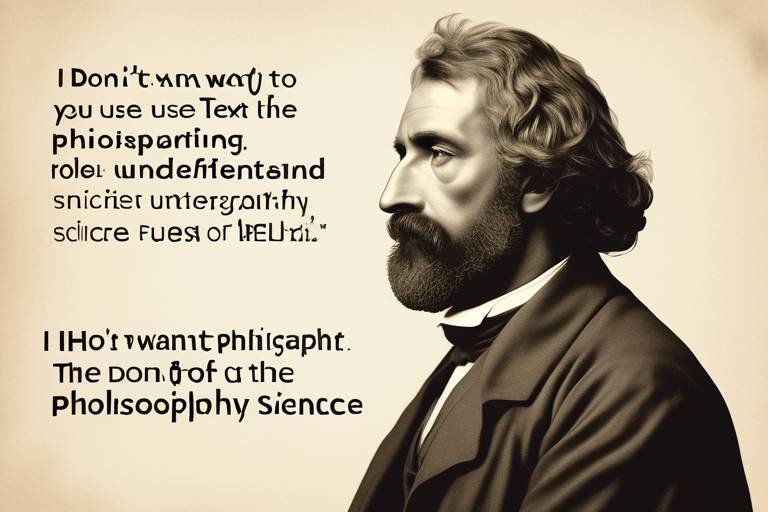Understanding Heidegger's Being and Time: A Critical Analysis
This article delves into Martin Heidegger's seminal work, Being and Time, exploring its key themes, philosophical implications, and critiques, while shedding light on its relevance in contemporary thought. Heidegger's philosophy is not just a series of abstract concepts; it is a profound inquiry into the very nature of existence itself. By dissecting the layers of his thought, we can better appreciate how his ideas resonate in our modern lives, influencing fields as diverse as psychology, literature, and even artificial intelligence.
Examining Heidegger's concept of 'Being' reveals its complexity and significance in his philosophy, emphasizing how it shapes human existence and our understanding of the world around us. For Heidegger, the question of Being is not merely a philosophical pastime; it is the fundamental question that has been overlooked by centuries of Western philosophy. He argues that by understanding Being, we can understand ourselves and our place in the universe. This exploration leads us to consider how we engage with our surroundings and the essence of our existence. Is Being simply about existence, or is it more about the quality and depth of that existence? Heidegger invites us to ponder these questions deeply, urging us to reconnect with our own experiences of being alive.
Heidegger introduces 'Dasein' as a central concept, representing human existence. This section explores how Dasein encapsulates the essence of being and the individual's relationship with time and space. Dasein is not just a being; it is a being that is aware of its own being. It is a unique position that allows humans to reflect on their existence, make choices, and, importantly, confront the reality of their mortality. This self-awareness is what sets Dasein apart from other entities in the world. The term itself translates to "being there," highlighting the importance of presence and engagement in the world. Through Dasein, Heidegger emphasizes that our existence is intertwined with our experiences, relationships, and the temporal nature of life.
Heidegger's analysis of time is crucial in Being and Time. He differentiates between ordinary time, which we measure with clocks and calendars, and existential time, which is about how we experience our lives. Ordinary time is linear and quantitative, while existential time is qualitative and subjective. This distinction is vital because it influences our understanding of existence. How often do we find ourselves lost in thought, reminiscing about the past or worrying about the future? Heidegger suggests that true understanding of our being comes from embracing the present moment and recognizing that our past and future are intertwined with our current existence.
Heidegger's notions of authenticity and inauthenticity highlight the choices individuals make in confronting their existence, impacting their experience of being and the world. To live authentically is to embrace one's freedom and responsibility, making choices that reflect one's true self rather than conforming to societal expectations. In contrast, inauthenticity arises when individuals allow external pressures to dictate their lives, leading to a superficial existence devoid of genuine meaning. This tension between authenticity and inauthenticity raises critical questions: Are we truly living our lives, or are we merely existing? What does it mean to be true to oneself in a world filled with distractions?
This section explores how relationships with others shape Dasein's understanding of itself and its existence, emphasizing the social dimension of Heidegger's philosophy. Dasein is inherently social; our interactions with others play a crucial role in shaping our identity and understanding of the world. Heidegger posits that we are always in relation to others, and these relationships can either enhance our authenticity or lead us toward inauthenticity. The influence of community, culture, and social norms cannot be understated. In a sense, our being is a tapestry woven from the threads of our connections with others, reflecting both our individuality and our shared human experience.
Heidegger's consideration of finitude and mortality is pivotal in understanding human existence. This section discusses how awareness of death influences our approach to life and choices. For Heidegger, the inevitability of death is not something to be feared; rather, it is a catalyst for living authentically. When we confront our mortality, we are compelled to examine our lives critically and make meaningful choices. This awareness can lead to a deeper appreciation for our experiences and relationships. In this light, death becomes a crucial element of life, urging us to live fully and authentically.
While influential, Heidegger's work has faced various critiques. This section examines significant criticisms, including those related to his political affiliations and interpretations of existentialism. Critics have pointed out that Heidegger's involvement with National Socialism raises ethical questions about his philosophy. Can we separate the thinker from his political beliefs? Furthermore, some argue that his ideas are overly abstract and disconnected from practical realities. These critiques invite us to engage with Heidegger's work critically, considering both its profound insights and its potential shortcomings.
Feminist theorists have challenged Heidegger's views on gender and existence. This part discusses their arguments and how they seek to reinterpret or critique his philosophical framework. Many feminists argue that Heidegger's philosophy reflects a masculine bias, neglecting the experiences and perspectives of women. They contend that his focus on individual authenticity overlooks the relational aspects of existence that are often central to women's lives. By examining these critiques, we can expand our understanding of Dasein and consider how gender influences our experience of being.
Postmodern thinkers offer alternative readings of Heidegger's work, questioning his foundational assumptions. This section explores their critiques and the implications for contemporary philosophy. Postmodernism challenges the idea of a singular truth or a fixed essence of being, suggesting instead that our understanding of existence is fragmented and fluid. This perspective invites us to reconsider Heidegger's ideas in light of contemporary debates about identity, meaning, and the nature of reality. In doing so, we can appreciate the richness of his thought while also acknowledging its limitations.
- What is the main focus of Heidegger's Being and Time?
Heidegger's Being and Time primarily focuses on the nature of existence and the concept of 'Being', particularly through the lens of human experience, known as Dasein. - How does Heidegger define Dasein?
Dasein is defined as the being that is aware of its own existence, emphasizing the individual's relationship with time and space. - What are the implications of Heidegger's ideas on authenticity?
Heidegger's ideas on authenticity encourage individuals to live genuinely and make choices that reflect their true selves rather than conforming to societal expectations.

Being and Time,
This article delves into Martin Heidegger's seminal work, Being and Time, exploring its key themes, philosophical implications, and critiques, while shedding light on its relevance in contemporary thought.
Examining Heidegger's concept of 'Being' reveals its complexity and significance in his philosophy, emphasizing how it shapes human existence and our understanding of the world around us. Heidegger invites us to reconsider our everyday assumptions about existence. He argues that we often take our being for granted, living in a state of what he calls forgetfulness of Being. This idea is not just a philosophical abstraction; it resonates deeply with our daily lives, compelling us to ask profound questions about our purpose and place in the universe.
Heidegger introduces 'Dasein' as a central concept, representing human existence. This section explores how Dasein encapsulates the essence of being and the individual's relationship with time and space. Dasein is unique because it is not just a being that exists; it is a being that is aware of its existence. This self-awareness brings with it a burden of choice and responsibility. Dasein is constantly navigating between its potentialities and the reality of its situation, making every decision a reflection of its essence.
Heidegger's analysis of time is crucial in Being and Time. This part discusses how he differentiates between ordinary time and existential time, influencing our understanding of existence. While we often measure time in hours and minutes, Heidegger invites us to consider a deeper, more existential understanding of time. He posits that our experience of time is intimately tied to our being. For instance, the past shapes our identity, the present is where we act, and the future is filled with possibilities. This triadic relationship creates a tapestry of existence that is rich and complex.
Heidegger's notions of authenticity and inauthenticity highlight the choices individuals make in confronting their existence, impacting their experience of being and the world. To live authentically is to embrace one's individuality and confront the realities of existence head-on. In contrast, inauthenticity arises when one succumbs to societal pressures, losing sight of personal values and desires. This can lead to a life that feels hollow or unfulfilling. The struggle for authenticity is a central theme in Heidegger's philosophy, urging us to live genuinely and meaningfully.
This section explores how relationships with others shape Dasein's understanding of itself and its existence, emphasizing the social dimension of Heidegger's philosophy. Dasein is not an isolated entity; rather, it exists in a web of relationships. Our interactions with others inform our understanding of who we are. Heidegger argues that our being is intertwined with the being of others, leading to a shared experience of existence. This interconnectedness can be both enriching and challenging, as it compels us to confront the opinions and expectations of those around us.
Heidegger's consideration of finitude and mortality is pivotal in understanding human existence. This section discusses how awareness of death influences our approach to life and choices. The inevitability of death is not merely a grim reality; it is a catalyst for authentic living. By acknowledging our finite nature, we are prompted to make conscious choices that reflect our true selves. This awareness can lead to a deeper appreciation of life and an urgency to live fully and authentically.
While influential, Heidegger's work has faced various critiques. This section examines significant criticisms, including those related to his political affiliations and interpretations of existentialism. Critics argue that his association with the Nazi regime casts a shadow over his philosophical contributions. Furthermore, some suggest that his ideas may inadvertently reinforce certain oppressive structures. These critiques challenge us to engage critically with Heidegger's work while recognizing its profound impact on existential thought.
Feminist theorists have challenged Heidegger's views on gender and existence. This part discusses their arguments and how they seek to reinterpret or critique his philosophical framework. Many feminists argue that Heidegger's focus on the individual overlooks the social and relational aspects of existence, particularly as they pertain to gender. They contend that his philosophy can perpetuate patriarchal structures and call for a more inclusive approach that considers diverse experiences of being.
Postmodern thinkers offer alternative readings of Heidegger's work, questioning his foundational assumptions. This section explores their critiques and the implications for contemporary philosophy. Postmodernism challenges the idea of a singular truth or essence, suggesting that Heidegger's focus on Being may overlook the multiplicity of experiences and identities. This critique invites a reexamination of existential philosophy in a rapidly changing world, where diversity and complexity are increasingly recognized.
- What is the main theme of Being and Time?
The primary theme revolves around the concept of 'Being' and how it shapes human existence, emphasizing the importance of self-awareness and authenticity. - What does Dasein mean?
Dasein refers to the unique mode of being that characterizes human existence, marked by self-awareness and the ability to reflect on one's own existence. - How does Heidegger view time?
Heidegger distinguishes between ordinary time and existential time, suggesting that our understanding of existence is deeply intertwined with our experience of time. - What are the critiques of Heidegger's philosophy?
Heidegger's work has faced critiques related to his political affiliations, gender perspectives, and foundational assumptions, particularly from feminist and postmodern viewpoints.

exploring its key themes, philosophical implications, and critiques, while shedding light on its relevance in contemporary thought.
This article delves into Martin Heidegger's seminal work, Being and Time, exploring its key themes, philosophical implications, and critiques, while shedding light on its relevance in contemporary thought.
Examining Heidegger's concept of 'Being' reveals its complexity and significance in his philosophy, emphasizing how it shapes human existence and our understanding of the world around us.
Heidegger introduces 'Dasein' as a central concept, representing human existence. This section explores how Dasein encapsulates the essence of being and the individual's relationship with time and space.
Heidegger's analysis of time is crucial in Being and Time. This part discusses how he differentiates between ordinary time and existential time, influencing our understanding of existence.
Heidegger's notions of authenticity and inauthenticity highlight the choices individuals make in confronting their existence, impacting their experience of being and the world.
This section explores how relationships with others shape Dasein's understanding of itself and its existence, emphasizing the social dimension of Heidegger's philosophy.
Heidegger's consideration of finitude and mortality is pivotal in understanding human existence. This section discusses how awareness of death influences our approach to life and choices.
While influential, Heidegger's work has faced various critiques. This section examines significant criticisms, including those related to his political affiliations and interpretations of existentialism.
Feminist theorists have challenged Heidegger's views on gender and existence. This part discusses their arguments and how they seek to reinterpret or critique his philosophical framework.
Postmodern thinkers offer alternative readings of Heidegger's work, questioning his foundational assumptions. This section explores their critiques and the implications for contemporary philosophy.
Heidegger's Being and Time is not just a philosophical text; it's a profound exploration of existence itself. At its core, the work grapples with the fundamental question: what does it mean to be? This question is not merely academic; it resonates deeply with our everyday lives. By dissecting the nature of being, Heidegger invites us to reconsider our own existence, our relationships, and our place in the world.
One of the key themes in Being and Time is the concept of Dasein, which refers to the experience of being that is unique to humans. Dasein is characterized by its awareness of itself, its surroundings, and its temporality. This awareness leads to a profound understanding of our existence, but it also brings with it a burden of responsibility. The implications of this are enormous, as they challenge us to live authentically—to make choices that reflect our true selves rather than conforming to societal expectations.
However, Heidegger's work is not without its critiques. Some scholars argue that his focus on individuality neglects the social dimensions of existence. Others point out that his political affiliations during the Nazi regime cast a shadow over his philosophical contributions. These critiques are essential for understanding the full impact of Heidegger's ideas and their relevance today.
In a world that often feels fragmented and chaotic, Heidegger's exploration of being encourages us to seek meaning and connection. It challenges us to confront the realities of our existence, including our mortality and the relationships we cultivate with others. This is where the philosophical implications of Being and Time become particularly poignant; they resonate with contemporary concerns about identity, community, and the search for authenticity in a rapidly changing world.
Ultimately, Heidegger's work serves as a bridge between existential philosophy and practical life. It invites us to reflect on our choices and the ways in which we engage with the world around us. By examining the key themes and critiques of Being and Time, we can appreciate its enduring relevance and the insights it offers into the human condition.
- What is the main argument of Heidegger's Being and Time?
Heidegger argues that understanding the nature of being is essential to grasping human existence. - What does Dasein mean?
Dasein refers to the experience of being that is unique to humans, encompassing our awareness and existence. - How does Heidegger view time?
Heidegger distinguishes between ordinary time and existential time, emphasizing the latter's role in shaping our understanding of existence. - What are some critiques of Heidegger's work?
Critiques include his political affiliations and the perceived neglect of social dimensions in his philosophy.

The Nature of Being
The exploration of Heidegger's concept of 'Being' is not just a philosophical endeavor; it's a profound journey into the essence of existence itself. Heidegger argues that the question of Being is the most fundamental question we can ask. But what does it mean to truly understand 'Being'? In his work Being and Time, he takes us on a path that reveals the intricate layers of existence, urging us to reflect on how we perceive the world around us. This notion of Being is not static; rather, it is dynamic and intertwined with our experiences and interactions.
At its core, Heidegger's inquiry into Being challenges us to consider how we relate to our surroundings and to ourselves. He posits that many of us live in a state of forgetfulness regarding Being. This forgetfulness leads to a superficial understanding of existence, where we get caught up in the mundane aspects of life, often failing to grasp the deeper significance of our existence. To illustrate this, think about how we often rush through our daily routines. We wake up, go to work, engage in social interactions, and repeat the cycle without pausing to contemplate the meaning behind these actions.
Heidegger introduces the idea that our understanding of Being is shaped by our historical context and our cultural background. This means that our conceptions of existence are not universal but are influenced by the world we inhabit. For instance, in different cultures, the understanding of life and death can vary significantly, showcasing how our environment molds our perception of Being. This leads us to consider the following aspects:
- Historical Influence: Our past experiences and the collective history of humanity shape our understanding of existence.
- Cultural Context: Different cultures offer unique perspectives on what it means to be, influencing our views on life, death, and everything in between.
- Personal Experience: Individual experiences play a crucial role in shaping our understanding of Being, as we each navigate our own paths.
Moreover, Heidegger emphasizes the importance of language in shaping our understanding of Being. Language is not merely a tool for communication; it is the medium through which we articulate our existence. In this way, language becomes a gateway to understanding our place in the world. Heidegger famously stated, “Language is the house of Being,” suggesting that our ability to express and communicate is intrinsically linked to our capacity to comprehend existence itself.
Ultimately, grappling with the nature of Being leads us to confront our own existence. It encourages us to ask profound questions: Who are we? What does it mean to exist? How do we navigate the complexities of life? By delving into these inquiries, we can begin to uncover the layers of our existence and strive towards a more authentic way of being. This journey is not just an intellectual exercise; it is a call to live more fully, to engage with the world around us, and to embrace the richness of our existence.

Dasein: The Human Condition
When we dive into Martin Heidegger's philosophy, we encounter the term Dasein, a German word that translates to "being there." But don't let the simplicity of the term fool you; it encapsulates a profound exploration of human existence. Dasein is not just about existing; it's about being aware of one's existence. Heidegger argues that to truly understand ourselves, we must first grasp the essence of Dasein, which is intricately linked to our experiences, choices, and the world we inhabit.
At its core, Dasein represents the human condition, highlighting our unique ability to reflect on our being. Unlike other entities in the world, humans possess a consciousness that allows for self-awareness and introspection. This self-awareness is crucial because it enables us to ask fundamental questions: Who am I? What is my purpose? How do I relate to others? These questions are not just philosophical musings; they are essential to our existence and shape our interactions with the world around us.
Heidegger emphasizes that Dasein is always situated in a specific context, influenced by time and space. We are not isolated beings; rather, we exist within a web of relationships and historical circumstances. This interconnectedness means that our understanding of ourselves is always evolving, shaped by our experiences and the people we encounter. In this sense, Dasein is a dynamic process, constantly unfolding as we navigate through life.
Another critical aspect of Dasein is its relationship with authenticity and inauthenticity. Heidegger posits that individuals often find themselves caught in the currents of societal norms and expectations, leading to a state of inauthenticity. Inauthentic Dasein is characterized by a lack of genuine engagement with one's own existence, often resulting in a life lived according to the dictates of others. Conversely, authentic Dasein is about embracing one's individuality and making choices that reflect one's true self. This authenticity is not just a philosophical ideal; it is a call to live deliberately and meaningfully.
To illustrate the concept of Dasein further, consider the following table that contrasts authentic and inauthentic modes of existence:
| Aspect | Authentic Dasein | Inauthentic Dasein |
|---|---|---|
| Self-awareness | High | Low |
| Decision-making | Independent | Conformist |
| Relationship with Others | Genuine | Superficial |
| Engagement with Existence | Active | Passive |
In conclusion, Dasein serves as a powerful lens through which we can examine the human condition. It encourages us to reflect on our existence and the choices we make. Are we living authentically, or are we merely going through the motions? By understanding Dasein, we can better navigate the complexities of life and forge deeper connections with ourselves and others. As we explore the implications of Dasein, we realize that our existence is not just a matter of being; it is about being engaged, being aware, and ultimately, being human.
- What does Dasein mean? Dasein is a term used by Heidegger to describe human existence, emphasizing self-awareness and the contextual nature of being.
- How does Dasein relate to authenticity? Authentic Dasein involves making choices that reflect one's true self, while inauthentic Dasein is characterized by conformity to societal norms.
- Why is Dasein important in philosophy? Dasein provides a framework for understanding the complexities of human existence, relationships, and the nature of being.

The Concept of Time
When we think about time, it often feels like a straight line, right? We wake up, go through our day, and eventually, we go to bed, all in a neat, orderly sequence. But Heidegger shakes this perception up in his masterpiece, Being and Time. He dives deep into the layers of time, suggesting that there's much more than just the ticking of a clock. For Heidegger, time isn't just a backdrop for our lives; it’s an integral part of our being.
Heidegger distinguishes between two types of time: ordinary time and existential time. Ordinary time is what we usually think of—measured, segmented, and predictable. It's the time we see on our watches, divided into hours and minutes. However, existential time is more profound. It reflects how we experience our existence, how we relate to our past, present, and future. It's about how we feel time passing and how it shapes our understanding of who we are.
Imagine standing at the edge of a river. The water flows continuously, yet you can only experience it at one moment. This is akin to Heidegger's idea of existential time. We are constantly moving through our existence, yet we can only grasp the present moment. Our past experiences shape our present choices, and our future possibilities influence our current actions. In this sense, time becomes a fabric that weaves our identity and existence together.
To further illustrate this concept, consider the following table, which contrasts ordinary time with existential time:
| Characteristic | Ordinary Time | Existential Time |
|---|---|---|
| Measurement | Quantifiable, linear | Qualitative, fluid |
| Perception | Objective, external | Subjective, internal |
| Impact on Being | Time as a constraint | Time as an opportunity for authenticity |
In this framework, Heidegger emphasizes the importance of being aware of our temporal existence. He argues that it’s through this awareness that we can live authentically. When we recognize that our time is finite, we begin to make choices that reflect our true selves rather than simply adhering to societal expectations. This leads us to a more profound understanding of our existence, where we can confront our fears, aspirations, and ultimately, our mortality.
Moreover, Heidegger's exploration of time also intersects with the concept of finitude. He suggests that our awareness of being finite beings—knowing that our time is limited—can push us toward a more meaningful existence. Instead of getting lost in the mundane, we are encouraged to embrace our freedom and make choices that resonate with our authentic selves. In a world that often feels chaotic and overwhelming, this perspective on time can offer a sense of grounding and purpose.
So, next time you glance at your watch or calendar, take a moment to reflect on how you perceive time. Are you merely counting the hours, or are you engaging with your existence in a way that truly matters? Heidegger challenges us to rethink our relationship with time, urging us to live fully in the present while being mindful of our past and future.
- What is the difference between ordinary time and existential time? Ordinary time is measured and linear, while existential time is qualitative and fluid, reflecting our internal experiences.
- How does Heidegger's concept of time influence authenticity? By understanding our finite existence, we can make choices that align with our true selves, leading to a more authentic life.
- Why is awareness of time important in Heidegger's philosophy? Awareness of time allows us to confront our existence, make meaningful choices, and embrace our freedom.

Being and Time.
This article delves into Martin Heidegger's seminal work, Being and Time, exploring its key themes, philosophical implications, and critiques, while shedding light on its relevance in contemporary thought.
Examining Heidegger's concept of 'Being' reveals its complexity and significance in his philosophy, emphasizing how it shapes human existence and our understanding of the world around us.
Heidegger introduces 'Dasein' as a central concept, representing human existence. This section explores how Dasein encapsulates the essence of being and the individual's relationship with time and space.
Heidegger's analysis of time is crucial in Being and Time. This part discusses how he differentiates between ordinary time and existential time, influencing our understanding of existence.
Heidegger's notions of authenticity and inauthenticity highlight the choices individuals make in confronting their existence, impacting their experience of being and the world.
This section explores how relationships with others shape Dasein's understanding of itself and its existence, emphasizing the social dimension of Heidegger's philosophy.
Heidegger's consideration of finitude and mortality is pivotal in understanding human existence. This section discusses how awareness of death influences our approach to life and choices.
While influential, Heidegger's work has faced various critiques. This section examines significant criticisms, including those related to his political affiliations and interpretations of existentialism.
Feminist theorists have challenged Heidegger's views on gender and existence. This part discusses their arguments and how they seek to reinterpret or critique his philosophical framework.
Postmodern thinkers offer alternative readings of Heidegger's work, questioning his foundational assumptions. This section explores their critiques and the implications for contemporary philosophy.
In Being and Time, Heidegger embarks on an exploration of the fundamental question of existence, or Being. He asserts that understanding the nature of Being is essential to grasping what it means to be human. This is a profound journey, akin to peeling back layers of an onion, revealing the core of our existence. Heidegger proposes that our grasp of Being is not merely an abstract concept but is deeply intertwined with our everyday experiences. He emphasizes that we often take our existence for granted, living in a state of forgetfulness about the true nature of Being.
Central to Heidegger's argument is the concept of Dasein, which refers to the experience of being that is unique to human beings. Dasein is characterized by its ability to reflect on its own existence and the world around it. In this sense, Dasein serves as a bridge between the abstract notion of Being and the practical, lived experience. Heidegger argues that Dasein is always situated in a specific context, influenced by its historical and cultural background. This situational aspect of Dasein underscores the importance of context in understanding human existence.
Moreover, Heidegger distinguishes between two modes of existence: authenticity and inauthenticity. Authenticity involves recognizing and embracing our own existence, making conscious choices that reflect our true selves. In contrast, inauthenticity arises when we conform to societal norms and expectations, leading us to live in a state of distraction and forgetfulness regarding our true nature. This dichotomy compels us to question our daily choices and the extent to which we are genuinely living versus merely existing.
Heidegger’s exploration of time is another critical aspect of Being and Time. He introduces the idea of existential time, which differs from the conventional understanding of chronological time. For Heidegger, time is not just a linear progression of moments but is intricately linked to our experiences and our understanding of Being. He posits that our awareness of the past, present, and future shapes our existence and influences our choices. This perspective invites us to reflect on how we relate to time and the impact it has on our lives.
In essence, Being and Time challenges us to confront the complexities of our existence. It urges us to reflect on our choices, our relationships, and our understanding of time, ultimately guiding us towards a more authentic way of being. Through this lens, we can appreciate the richness of our existence and the profound questions that arise from it.
- What is the main theme of Being and Time?
The main theme revolves around the exploration of Being, particularly through the lens of human existence or Dasein. - How does Heidegger define Dasein?
Dasein is defined as the experience of being that is unique to humans, characterized by self-reflection and contextual existence. - What is the significance of authenticity in Heidegger's philosophy?
Authenticity is significant as it represents a mode of existence where individuals make conscious choices that reflect their true selves. - How does Heidegger's concept of time differ from conventional views?
Heidegger's concept of existential time emphasizes the influence of our past, present, and future on our experiences, contrasting with the linear view of chronological time.

This part discusses how he differentiates between ordinary time and existential time, influencing our understanding of existence.
This article delves into Martin Heidegger's seminal work, Being and Time, exploring its key themes, philosophical implications, and critiques, while shedding light on its relevance in contemporary thought.
Examining Heidegger's concept of 'Being' reveals its complexity and significance in his philosophy, emphasizing how it shapes human existence and our understanding of the world around us.
Heidegger introduces 'Dasein' as a central concept, representing human existence. This section explores how Dasein encapsulates the essence of being and the individual's relationship with time and space.
Heidegger's analysis of time is crucial in Being and Time. This part discusses how he differentiates between ordinary time and existential time, influencing our understanding of existence.
Ordinary time, as we often perceive it, is a linear progression marked by clocks and calendars. It is the time we schedule our appointments, the hours we count until the weekend, and the years we celebrate. This conventional view of time is quantitative, focusing on measurement and division. However, Heidegger challenges this notion by introducing the concept of existential time, which is deeply intertwined with our experience of being.
Existential time, according to Heidegger, is qualitative and subjective. It is not merely about counting seconds or marking days; it reflects how we experience moments in our lives. For instance, think about how time feels when you are engaged in a passionate activity versus when you are waiting in a dull meeting. In these scenarios, time stretches and contracts, demonstrating that our perception of time can be influenced by our emotional states and existential concerns.
To illustrate this distinction further, consider the following table:
| Aspect | Ordinary Time | Existential Time |
|---|---|---|
| Nature | Quantitative | Qualitative |
| Measurement | Clock-based | Experience-based |
| Perception | Uniform | Variable |
| Influence | External | Internal |
This differentiation is not just a philosophical exercise; it has profound implications for how we understand our existence. When we recognize that our experience of time is shaped by our being, we begin to see that our lives are not merely a series of events to be timed but rather a rich tapestry of experiences that define who we are. This understanding encourages us to live more authentically, embracing the moments that truly matter rather than getting lost in the relentless march of ordinary time.
Heidegger's notions of authenticity and inauthenticity highlight the choices individuals make in confronting their existence, impacting their experience of being and the world.
This section explores how relationships with others shape Dasein's understanding of itself and its existence, emphasizing the social dimension of Heidegger's philosophy.
Heidegger's consideration of finitude and mortality is pivotal in understanding human existence. This section discusses how awareness of death influences our approach to life and choices.
While influential, Heidegger's work has faced various critiques. This section examines significant criticisms, including those related to his political affiliations and interpretations of existentialism.
Feminist theorists have challenged Heidegger's views on gender and existence. This part discusses their arguments and how they seek to reinterpret or critique his philosophical framework.
Postmodern thinkers offer alternative readings of Heidegger's work, questioning his foundational assumptions. This section explores their critiques and the implications for contemporary philosophy.
- What is the main theme of Heidegger's Being and Time?
The main theme revolves around the nature of being, particularly human existence and our relationship with time and space.
- How does Heidegger differentiate between ordinary and existential time?
Heidegger distinguishes them by suggesting that ordinary time is quantitative and clock-based, while existential time is qualitative and experience-based.
- What is Dasein?
Dasein refers to the experience of being that is unique to humans, encapsulating our existence and relationship with the world.
- Why is authenticity important in Heidegger's philosophy?
Authenticity is crucial as it allows individuals to confront their existence and make meaningful choices, impacting their experience of being.

Martin Heidegger's exploration of authenticity and inauthenticity serves as a profound lens through which we can examine our existence. At its core, authenticity refers to living in accordance with one's true self, embracing the unique path that life offers. In contrast, inauthenticity represents a state of being where individuals conform to societal norms and expectations, often losing sight of their genuine desires and aspirations. This dichotomy raises an essential question: Are we truly living for ourselves, or are we merely playing a role dictated by the world around us?
Heidegger argues that the journey toward authenticity is fraught with challenges. To achieve authenticity, one must confront the existential angst that arises from the realization of our freedom and the weight of our choices. This struggle often leads to a confrontation with the concept of Dasein, or our being-in-the-world, which emphasizes our interconnectedness with others and the environment. In this sense, authenticity is not just a solitary endeavor; it is deeply entwined with our relationships and the way we engage with the world.
To illustrate this further, consider the following scenarios:
- Authentic Living: A person who chooses a career aligned with their passions, despite societal pressure to pursue a more lucrative but unfulfilling job.
- Inauthentic Living: An individual who adheres to a lifestyle dictated by social media trends, sacrificing their own interests and happiness for the sake of acceptance.
Heidegger emphasizes that authenticity requires a conscious effort to acknowledge and embrace our individuality. This process involves reflecting on our choices and recognizing the influence of others on our lives. The challenge lies in resisting the urge to conform and instead making choices that resonate with our true selves. It’s about peeling back the layers of societal expectations and discovering what it means to be genuinely human.
Moreover, Heidegger posits that the awareness of our mortality plays a crucial role in this quest for authenticity. When we confront the inevitability of death, we are compelled to evaluate our lives more critically. This awareness can either lead to despair or serve as a catalyst for embracing authenticity. It prompts us to ask ourselves: What legacy do we wish to leave behind? How can we live fully in the time we have?
In conclusion, the concepts of authenticity and inauthenticity are not merely philosophical abstractions; they are vital components of our everyday lives. They challenge us to reflect on our choices, confront our fears, and ultimately strive for a life that is true to ourselves. Heidegger's insights remind us that the path to authenticity is a continuous journey, one that requires courage, self-reflection, and a willingness to embrace our unique existence in a world that often pressures us to conform.
- What does Heidegger mean by authenticity? Heidegger defines authenticity as living in accordance with one's true self, making choices that reflect individual desires rather than societal pressures.
- How does inauthenticity manifest in our lives? Inauthenticity often manifests as conformity to societal norms, where individuals prioritize external validation over their genuine interests and aspirations.
- Why is the awareness of mortality important in Heidegger's philosophy? The awareness of mortality encourages individuals to reflect on their lives, prompting them to make choices that align with their true selves and embrace authenticity.

In the grand tapestry of existence, the role of others is not merely a thread but a vibrant color that shapes our understanding of being. Heidegger posits that our relationships with others are fundamental to the concept of Dasein. This idea suggests that we do not exist in isolation; rather, our identity and sense of self are intricately woven into the fabric of social interactions. Think of it this way: just as a painter relies on a palette of colors to create a masterpiece, individuals rely on their relationships to define who they are.
Heidegger introduces the notion of being-with-others (Mitsein), emphasizing that our existence is always contextualized within a social framework. This concept suggests that our understanding of ourselves is deeply influenced by how we perceive and interact with others. For instance, consider how your friends and family impact your decisions, values, and even your emotional state. Their presence in your life acts as a mirror, reflecting back aspects of your identity that you might not even be aware of.
Moreover, Heidegger argues that the presence of others can either enhance or hinder our authenticity. In a world saturated with societal expectations and norms, individuals often find themselves conforming to the collective. This leads to a sense of inauthenticity, where one's true self is overshadowed by the demands of the group. To illustrate this point, imagine a musician who feels pressured to play popular songs instead of their own compositions. In this scenario, the musician's authentic expression is stifled by the expectations of their audience. Thus, the role of others can be a double-edged sword, offering both connection and constraint.
Heidegger also emphasizes the importance of shared experiences in shaping our understanding of existence. When we engage with others, we create a shared reality that can enrich our lives. This shared reality fosters a sense of belonging and community, essential for our well-being. For example, consider the way a group of friends gathers to celebrate a milestone. The joy, laughter, and camaraderie experienced in that moment not only strengthen their bonds but also contribute to their individual identities.
However, it's crucial to acknowledge that not all interactions are beneficial. The influence of others can sometimes lead to existential angst, particularly when individuals feel alienated or misunderstood. This highlights the delicate balance between connection and isolation that Heidegger explores. In a world where social media often amplifies feelings of inadequacy and comparison, the role of others becomes even more complex. We find ourselves navigating a landscape where genuine connection is often overshadowed by superficial interactions.
In conclusion, the role of others in Heidegger's philosophy is multifaceted, serving as both a source of enrichment and a potential source of conflict. Our relationships shape our understanding of being, pushing us toward authenticity or pulling us into the depths of inauthenticity. As we traverse this intricate web of social existence, it's essential to remain mindful of how our interactions influence our essence. By fostering genuine connections and embracing the complexity of our relationships, we can navigate the challenges of existence with greater awareness and authenticity.
- What is Dasein in Heidegger's philosophy?
Dasein refers to the experience of being that is unique to humans, emphasizing our ability to reflect on our existence and make choices. - How does Heidegger view the concept of time?
Heidegger distinguishes between ordinary, measurable time and existential time, which relates to our lived experience and understanding of being. - What are the implications of authenticity and inauthenticity?
Authenticity involves living in accordance with one's true self, while inauthenticity arises from conforming to societal expectations, impacting our experience of existence. - How do relationships influence our understanding of self?
Heidegger argues that our interactions with others shape our identity, reflecting aspects of ourselves and contributing to our sense of belonging.

When we dive into Martin Heidegger's philosophy, we quickly realize that the concepts of finitude and mortality are not just abstract ideas; they are fundamental to understanding what it means to be human. Heidegger argues that the awareness of our own mortality profoundly shapes our existence. Imagine standing at the edge of a vast cliff, looking down into the abyss. This metaphor captures the essence of how mortality looms over us, influencing our choices and the way we relate to the world. It’s not just about the end of life; it’s about how that awareness colors every moment we live.
Heidegger introduces the term Being-toward-death to describe our relationship with mortality. This concept implies that rather than viewing death as a mere endpoint, we should see it as a guiding force that shapes our existence. When we embrace the reality of our finitude, we begin to live more authentically. This means making choices that resonate with our true selves rather than conforming to societal expectations. Think of it as a wake-up call—an invitation to prioritize what truly matters in our lives.
Furthermore, Heidegger contrasts two ways of being in relation to death: the inauthentic way, where individuals deny or avoid the reality of mortality, and the authentic way, where one acknowledges and accepts it. The inauthentic individual may live in a state of distraction, chasing after superficial goals, while the authentic individual confronts their mortality head-on, leading to a more meaningful existence. This confrontation can be daunting, but it ultimately liberates us to make choices that reflect our deepest values.
To illustrate this further, let’s consider a few key points about how finitude influences our lives:
- Awareness of Time: Recognizing that our time is limited encourages us to prioritize our goals and relationships.
- Value of Experiences: Understanding mortality pushes us to seek out experiences that bring us joy and fulfillment.
- Authentic Living: Embracing our finitude can lead to a life that is more aligned with our true selves.
In essence, Heidegger prompts us to reflect on how our awareness of death shapes our existence. By confronting our mortality, we can cultivate a deeper appreciation for life, leading to a more authentic way of being. This concept resonates not only within philosophical circles but also in everyday life. Just think about those moments when you’ve felt an urgency to connect with loved ones or pursue a long-held dream. Those moments often arise from a recognition of life’s fleeting nature, reminding us to seize the day.
In conclusion, the exploration of finitude and mortality in Heidegger's thought is not merely an academic exercise; it’s a deeply personal journey that invites us to reflect on our own lives. By recognizing the inevitability of death, we can embrace life with a renewed sense of purpose and authenticity. So, the next time you find yourself pondering the big questions, remember that your awareness of mortality can be a powerful catalyst for living fully in the present.
- What is the significance of finitude in Heidegger's philosophy?
Finitude is crucial as it shapes our understanding of existence, urging us to confront our mortality and live authentically. - How does Heidegger differentiate between authentic and inauthentic living?
Authentic living involves embracing one's mortality and making choices aligned with personal values, while inauthentic living often involves avoiding the reality of death. - Can awareness of mortality really change how we live our lives?
Yes, being aware of our mortality can motivate us to prioritize meaningful experiences and relationships, leading to a more fulfilling life.

While Martin Heidegger's Being and Time has undeniably left a profound mark on the landscape of philosophy, it's essential to recognize that his work is not without its controversies and critiques. Many scholars have examined his ideas through various lenses, raising questions about the implications of his thoughts on existence, time, and being. One of the most significant critiques revolves around his political affiliations, particularly his involvement with the Nazi Party during the 1930s. This association has led to a complex discussion about the ethical ramifications of his philosophy and whether it can be disentangled from his political beliefs.
Beyond the political dimension, critics have also pointed out that Heidegger's writings can be notoriously dense and obscure, making them less accessible to those outside the philosophical elite. This has sparked debates about the practicality of his ideas in everyday life. In addition, some philosophers argue that his focus on existentialism and individual experience may overlook the collective dimensions of human existence. They contend that while Heidegger emphasizes the self, he neglects the roles of community and social structures in shaping our understanding of being.
Another area of critique comes from feminist theorists who challenge Heidegger's views on gender and existence. They argue that his philosophy tends to reinforce traditional gender roles and fails to adequately address the experiences of women. For instance, some feminists assert that his concept of Dasein is inherently male-centric, as it often reflects a masculine perspective on existence. This critique invites a reevaluation of Heidegger's ideas, suggesting that they may need to be adapted or reinterpreted to be more inclusive of diverse experiences.
Moreover, postmodern thinkers have raised questions about Heidegger's foundational assumptions. They argue that his approach to being and time is overly deterministic, potentially leading to a form of existential nihilism. This perspective challenges the notion that individuals can achieve authentic existence through self-reflection and choice, positing instead that our realities are shaped by broader societal forces beyond our control.
In summary, while Heidegger's philosophy offers rich insights into the nature of existence, it is crucial to engage critically with his ideas. The critiques surrounding his work highlight the importance of examining philosophical concepts through multiple lenses, ensuring that diverse voices and experiences are included in the discourse. By doing so, we can appreciate the depth of Heidegger's contributions while also acknowledging their limitations.
- What are the main criticisms of Heidegger's philosophy? Critics often focus on his political affiliations, accessibility of his writing, neglect of social dimensions, and gender biases.
- How does Heidegger's concept of Dasein relate to modern existentialism? Dasein encapsulates individual existence, influencing existentialist thought by emphasizing personal choice and authenticity.
- What role does community play in Heidegger's philosophy? While Heidegger focuses on the individual, critics argue that he overlooks the significance of community and social structures in shaping our understanding of being.

Feminist critiques of Martin Heidegger's philosophy have emerged as a significant discourse in contemporary thought, challenging the traditional interpretations of his work. At the core of these critiques is the argument that Heidegger's conception of 'Being' and 'Dasein' is inherently gendered, often sidelining women's experiences and perspectives. Feminist theorists assert that his analysis primarily reflects a masculine viewpoint, which does not adequately account for the complexities of female existence and identity.
One of the key contentions is that Heidegger's focus on individual existence and authenticity tends to overlook the relational aspects of being, particularly as they pertain to women. While he emphasizes the solitary nature of Dasein's confrontation with existence, feminist thinkers argue that this perspective neglects the significance of social relationships and communal experiences that shape women's lives. For instance, the notion of 'Being-with-others' in Heidegger's philosophy is often critiqued for its lack of depth regarding how gender dynamics influence these interactions.
Furthermore, feminist critiques highlight how Heidegger's language and terminology can perpetuate patriarchal structures. His use of terms like 'man' to describe human existence is seen as exclusionary, reinforcing a binary understanding of gender that fails to resonate with the lived realities of women and non-binary individuals. This raises important questions about the universality of Heidegger's existential claims and whether they can be genuinely applied to all human experiences.
In response to these critiques, some feminist philosophers have sought to reinterpret Heidegger's ideas through a more inclusive lens. They argue for a re-examination of his concepts in light of gender, suggesting that a nuanced understanding of Dasein can incorporate the relational and social dimensions of existence that are often overlooked. This re-interpretation aims to bridge the gap between Heidegger's existential philosophy and feminist thought, proposing that both can coexist and enrich one another.
Additionally, the intersection of Heidegger's philosophy with feminist theories invites a broader discussion on how existentialism can evolve to address issues of gender, identity, and power. By engaging with these critiques, we can foster a more comprehensive understanding of what it means to 'be' in a world that is not only shaped by existential choices but also by the socio-political contexts that influence those choices.
In summary, feminist critiques of Heidegger not only challenge the gender biases inherent in his philosophy but also open up new avenues for dialogue and reinterpretation. By questioning the foundational assumptions of his work, feminist theorists contribute to a richer, more diverse philosophical landscape that acknowledges the complexities of human existence.
- What are the main criticisms of Heidegger's philosophy from a feminist perspective?
Feminist critiques focus on the gendered nature of Heidegger's concepts, arguing that they reflect a masculine viewpoint and overlook women's experiences. - How do feminist theorists reinterpret Heidegger's ideas?
They seek to incorporate relational and social dimensions into the understanding of Dasein, proposing that a more inclusive approach can enrich existential philosophy. - What implications do these critiques have for contemporary philosophy?
The critiques encourage a re-evaluation of existentialism, prompting discussions on gender, identity, and power dynamics in philosophical discourse.

Postmodern thinkers have approached Martin Heidegger's philosophy with a critical lens, often questioning the very foundations upon which his ideas stand. The essence of postmodernism lies in its skepticism towards grand narratives and absolute truths, which starkly contrasts with Heidegger's attempts to uncover the nature of Being as a universal concept. One of the most significant critiques comes from the idea that Heidegger's work, while profound, inadvertently perpetuates a form of essentialism that postmodernists vehemently oppose. They argue that by seeking a singular understanding of Being, Heidegger risks overlooking the plurality of experiences and interpretations that shape human existence.
For instance, postmodern theorist Jacques Derrida introduced the concept of "deconstruction," which challenges the binary oppositions that often underpin philosophical discourse. In the context of Heidegger, Derrida's approach suggests that the very language Heidegger uses is fraught with ambiguities and contradictions, leading to multiple interpretations of Being. This perspective emphasizes that meaning is not fixed but rather fluid and contingent upon context. Thus, postmodern thinkers argue that Heidegger's insistence on a definitive understanding of Being can be seen as an oversimplification of the complexities inherent in existence.
Moreover, the postmodern critique extends to Heidegger's notion of authenticity. While Heidegger posits that individuals must confront their own existence to achieve authenticity, postmodernists question whether such a pursuit is genuinely attainable. They suggest that the very idea of an authentic self is a construct shaped by societal norms, cultural influences, and historical contexts. This raises the provocative question: Can one ever be truly authentic in a world where identity is constantly negotiated and redefined?
In addition, postmodern perspectives highlight the importance of context and the social dimensions of existence. They argue that Heidegger's focus on individual Dasein overlooks the interconnectedness of human beings. In our contemporary world, where globalization and digital communication have transformed interpersonal relationships, the notion of self cannot be divorced from the collective experiences that shape it. Thus, postmodern thinkers advocate for a more relational understanding of existence, one that acknowledges the myriad influences that contribute to our identities.
To summarize, the postmodern critique of Heidegger's philosophy invites us to reconsider the implications of his ideas in light of contemporary thought. It encourages a dialogue that embraces complexity, multiplicity, and the fluid nature of meaning. By challenging the foundational assumptions of Heidegger's work, postmodern theorists not only enrich our understanding of Being but also open up new avenues for exploring the intricacies of human existence in a rapidly changing world.
- What is the main focus of Heidegger's "Being and Time"?
Heidegger's "Being and Time" primarily explores the concept of Being, emphasizing human existence (Dasein) and its relationship with time, authenticity, and the social dimension of life. - How do postmodern thinkers critique Heidegger's philosophy?
Postmodern thinkers critique Heidegger for his essentialist views on Being, questioning the possibility of a singular truth and emphasizing the fluidity of meaning and identity. - What is the significance of Dasein in Heidegger's work?
Dasein represents human existence and encapsulates the essence of being, highlighting the individual's relationship with time, space, and others. - How does Heidegger's notion of authenticity differ from postmodern views?
Heidegger sees authenticity as a personal confrontation with one's existence, while postmodernism argues that authenticity is a construct influenced by societal and cultural factors.
Frequently Asked Questions
- What is the central theme of Heidegger's Being and Time?
Heidegger's Being and Time primarily explores the concept of 'Being' and its significance in understanding human existence. It emphasizes how our perception of being shapes our experiences and interactions with the world around us.
- What does Dasein mean in Heidegger's philosophy?
Dasein is a term Heidegger uses to describe human existence. It signifies the unique way humans engage with their surroundings, emphasizing our relationship with time and space as fundamental to understanding our being.
- How does Heidegger differentiate between ordinary time and existential time?
Heidegger argues that ordinary time is linear and measured, while existential time is more about the individual's experience and perception of time, deeply intertwined with their existence and choices.
- What are authenticity and inauthenticity according to Heidegger?
Authenticity refers to living in accordance with one's true self and acknowledging one's existence, while inauthenticity involves conforming to societal norms and expectations, leading to a superficial existence.
- How do relationships with others influence Dasein?
Heidegger posits that our interactions with others are crucial for shaping our understanding of ourselves and our existence. These relationships highlight the social dimension of being, emphasizing that we are not isolated beings.
- What role does the awareness of mortality play in Heidegger's philosophy?
The awareness of mortality is pivotal in Heidegger's thought, as it encourages individuals to confront their existence more authentically, influencing their choices and approach to life.
- What are some critiques of Heidegger's work?
Heidegger's philosophy has faced various critiques, including concerns regarding his political affiliations and interpretations of existentialism. Critics argue that these aspects may undermine the universality of his ideas.
- How do feminist theorists critique Heidegger's views?
Feminist theorists challenge Heidegger's perspectives on gender and existence, arguing that his framework often overlooks or marginalizes women's experiences and contributions to philosophical discourse.
- What are postmodern critiques of Heidegger's philosophy?
Postmodern thinkers question the foundational assumptions in Heidegger's work, offering alternative readings that challenge his ideas on existence and suggest that his philosophy may not adequately address contemporary issues.



















